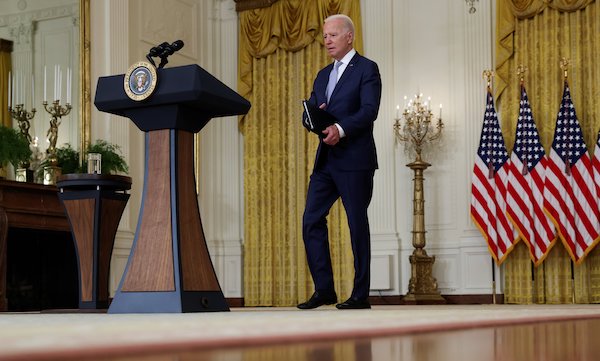
NEW YORK — Catholic leaders joined almost two dozen interfaith organizations in calling for changes to the childcare and universal pre-kindergarten provisions in the Biden administration’s Build Back Better Act so that it won’t indirectly exclude religious providers from the programs.
There’s nothing in the legislation’s current text that explicitly excludes religious providers from participation in the programs. Instead, what religious leaders argue is that technical aspects of the bill’s provisions force providers to comply with federal nondiscrimination provisions, which many religious providers would be unwilling to do because of their beliefs.
“The faith community has always affirmed that parents should choose the best environment for care and education of their children,” the leaders write in a letter to Congress. “The current Build Back Better Act provisions would severely limit the options for parents, suffocate the mixed delivery system for childcare and pre-K, and greatly restrict the number of providers available for a successful national program.”
The letter was cosigned by Cardinal Timothy Dolan of New York, chairman of the USCCB religious liberty committee, and Bishop Thomas Daly of Spokane, chairman of the USCCB Catholic education committee. Catholic Charities USA and the National Catholic Educational Association were among the organizations that cosigned the letter.
The letter was addressed to Senate Committee on Health, Education, Labor, and Pensions Chair Patty Murray (D-Wash.), and ranking member Richard Burr (R-N.C.). Speaker of the House Nancy Pelosi and House Minority Leader Kevin McCarthy, Senate Majority Leader Chuck Schumer and Minority Leader Mitch McConnell, House Committee on Education and Labor Chairman Robert Scott, and ranking member Virginia Foxx were also sent copies of the letter.
The Build Back Better Act commits a combined $380 billion dollars to national childcare and universal pre-K programs. The House of Representatives passed it in November, and it now goes to the Senate.
The childcare program would operate through existing legislation — the Child Care and Development Block Grant (CCDBG) — which, since 1990, has given money to states to pass on to low-income families in the form of a voucher, or what the Biden administration has now coined a “certificate.” The CCDBG has always included religious freedom protections.
Universal pre-K would be a new federal program. The Build Back Better Act version would operate exclusively on federal grants to providers. It would also force states to fold their universal pre-K programs, which many have, into the new federal program. The letter argues this “threatens to remove faith-based providers from successful, existing state programs that are more protective of faith-based providers’ autonomy than” the Build Back Better Act.
With both the childcare program and universal pre-K program, the Build Back Better Act stipulates participating providers are considered recipients of federal financial assistance, and adds that nondiscrimination provisions “shall apply to any program or activity that receives federal funds under this section” with no religious exemptions included.
The nondiscrimination requirements the bill outlines are Title IX of the Education Amendments of 1972, Title VI of the Civil Rights Act of 1964, Section 504 of the Rehabilitation Act of 1973, the Americans with Disabilities Act of 1990, and Section of 654 of the Head Start Act.
This is where religious providers may choose to exclude themselves from the programs if they can’t comply with the nondiscrimination requirements above.
The letter particularly highlights the 2007 Head Start Act, which authorizes the nationwide Head Start program that provides “comprehensive development services” to “economically disadvantaged” pre-K children and their families. The concern with the Head Start Act, according to the letter, is three-fold — It doesn’t include religious exemptions, it prohibits discrimination on the basis of sex and belief, and it could undermine religious freedom protections in Title IX and Title VII.
“Application of the Head Start nondiscrimination provisions to faith-based providers could, for instance, interfere with faith-based providers’ protected rights under Title VII and Title XI regarding curricula or teaching, sex-specific programs, and preferences for employing individuals who share the providers’ religious beliefs,” the letter argues.
“The Head Start nondiscrimination provisions’ implementing regulations also contain requirements that would pose operational difficulties for many faith-based schools and child care providers,” the letter continues.
In a November statement to The Tablet ahead of the bill’s passage, an aide of the House Committee on Education and Labor reiterated that faith-based organizations are eligible to receive funding through the programs, but dodged acknowledging the new stipulations they have to follow.
“Faith-based providers are an important part of the solution, and they are eligible to receive funding under both the childcare and preschool provisions in the bill,” the aide said.
The letter concludes that faith-based providers want to contribute to the program.
“Our concerns do not represent a desire to exclude anyone from faith-based early learning. Faith-based providers strive to serve everyone, especially the less fortunate, whom the [Build Back Better Act’s] childcare and [universal pre-K] programs are specifically intended to benefit,” says the letter.
“We simply ask to be allowed to continue our good work in caring for our nation’s children in a manner consistent with our beliefs.”
